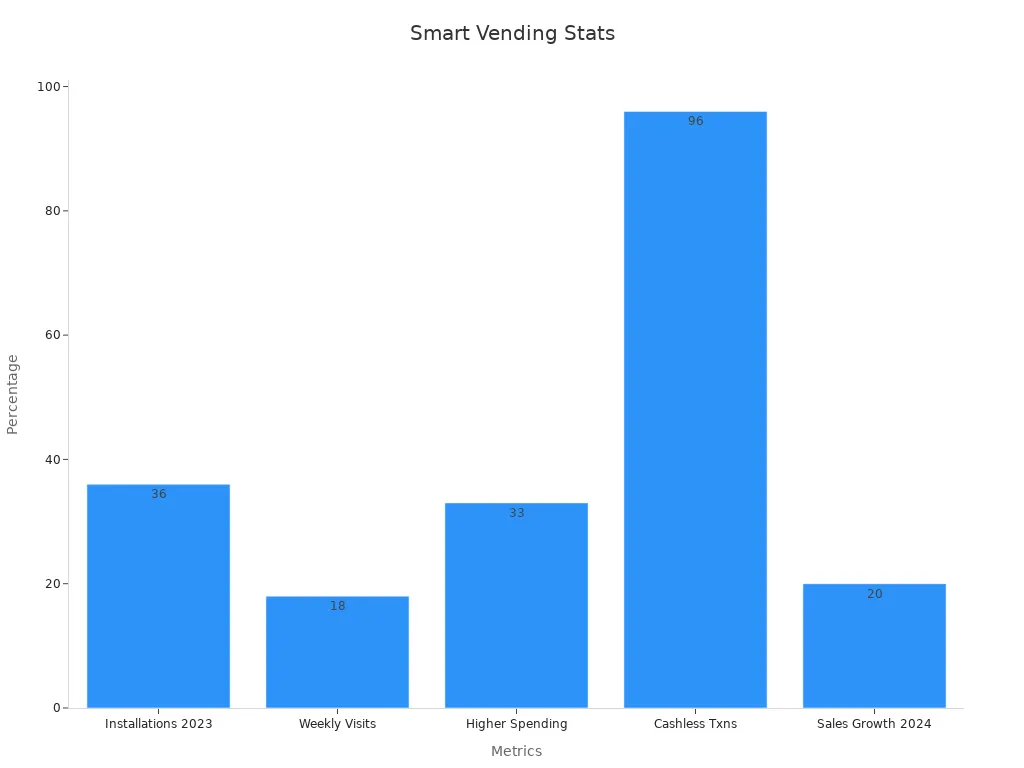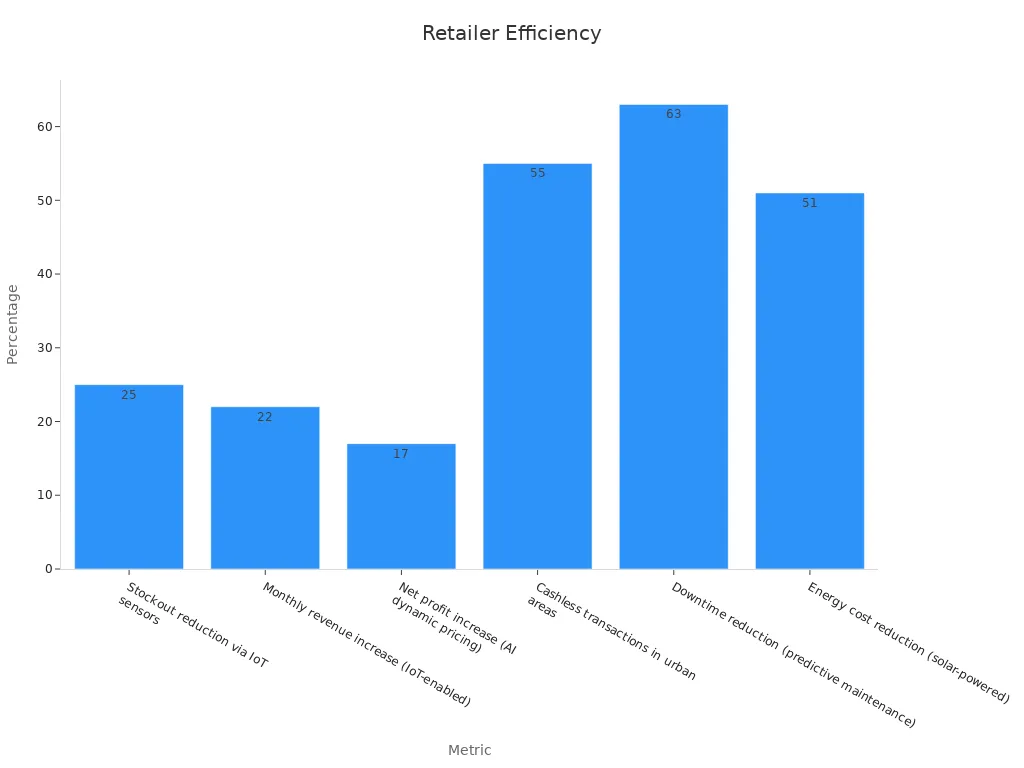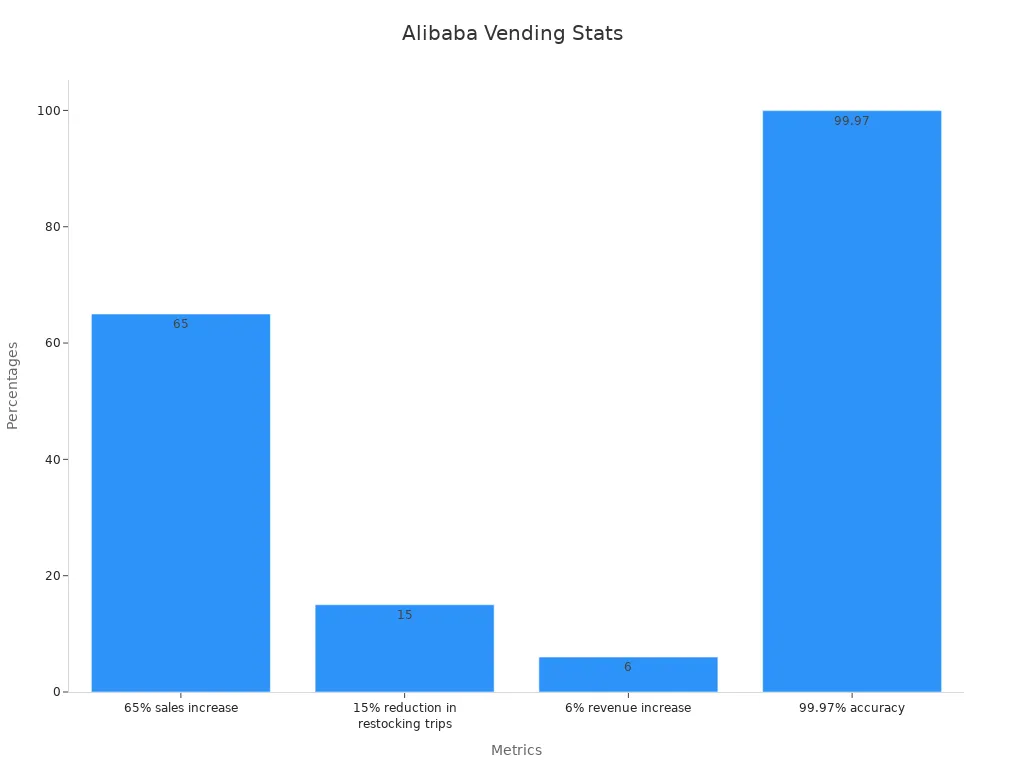Alibaba's Smart Vending Machines revolutionizing consumer convenience in retail

Imagine a customer walking up to a vending machine that greets them by name and suggests their favorite snack. Alibaba's smart vending machines use AI and IoT to learn what each customer likes. These machines accept cashless payments, including face ID, making every transaction quick. In China, smart vending machines now serve a wide variety of products and operate day and night.
The machines offer 24/7 access, personalized pricing, and interactive engagement.
They use big data for smart replenishment, helping shopkeepers keep shelves stocked.
Alibaba's smart vending machines are revolutionizing retail by making shopping easier for every customer.
Key Takeaways
Alibaba's smart vending machines use AI and IoT to offer personalized shopping with fast, cashless payments.
These machines provide 24/7 access, making shopping easy anytime without waiting in lines.
Real-time inventory tracking helps keep products stocked and reduces waste for retailers.
Retailers save money with lower staffing needs, less downtime, and better sales through data-driven operations.
The future of smart vending includes growth in automated stores, but success depends on solving challenges like inventory and staff training.
What Are Smart Vending Machines

Evolution from Traditional Vending
Vending machines have a long history. The first known example appeared in ancient Greece, where Hero of Alexandria created a coin-operated holy water dispenser. Over time, vending machines spread to England in the 17th century, selling tobacco, and to the United States in 1888, where the Thomas Adams Gum Company introduced a gum vending machine. The industry has grown rapidly. In 2023, the U.S. vending machine industry reached $18.2 billion, with about 3 million machines in operation.
Aspect | Example | Details |
|---|---|---|
Ancient Origin | Holy water dispenser | Coin-activated, 1st century CE |
Early Modern | Tobacco machine | 17th-century England |
U.S. Entry | Gum machine | 1888, Thomas Adams Gum Company |
Modern Growth | Industry value | $18.2 billion (2023, U.S.) |
Tech Shift | Smart vending machines | Touchscreens, AI, IoT, cashless payments |
Modern smart vending machines now offer much more than snacks and drinks. They use touchscreens, accept cashless payments, and connect to the internet. Some even use computer vision to identify products and allow seamless checkout. Specialty vending machines provide coffee, healthy snacks, or electronics. Combo machines combine snacks and drinks in one unit. Micro markets offer a wider range of products and self-checkout, showing how vending machine stores have adapted to new consumer needs.
Features of Alibaba's Smart Vending Machines
Alibaba's smart vending machines stand out in the world of unmanned stores. These machines use advanced technology to improve both customer experience and store operations.
Support for multiple payment options, including card readers and Apple Pay, not just cash.
Seamless, contactless, and fast payment experiences.
Real-time inventory management and automated product dispensing.
Data-driven insights help operators monitor preferences and optimize restocking.
Remote management through IoT connectivity.
Smart vending machines use data analytics to track what sells best. Operators can see inventory levels in real time and restock before products run out. This reduces costs and improves efficiency. The market for smart vending machines was valued at $4.85 billion in 2024 and is expected to reach $10.80 billion by 2034. The growth shows strong demand for convenience and technology. Alibaba's smart vending machines help lead this trend, making vending machine stores more efficient and customer-friendly.
Key Technologies
AI and Personalization
Smart vending machines use advanced technology to learn about each customer. AI collects data on buying habits and preferences. For example, a machine in a gym may notice that people buy more protein bars and water. It will then suggest these items to new customers. Some machines use facial recognition or mobile apps to greet returning users and offer products they like. AI-powered vending machines can even give special promotions based on past purchases. These features help increase sales and make shopping more enjoyable. Companies have seen higher revenue and better customer engagement by using AI in smart vending machines. In airports, machines recognize frequent travelers and suggest snacks or drinks they often buy. This level of personalization sets smart vending machines apart from traditional options.
IoT and Real-Time Inventory
Smart vending machines rely on advanced technology like IoT to track inventory. Sensors inside the machines monitor stock levels all the time. When a product runs low, the system sends an alert to the operator. This helps keep shelves full and reduces the chance of running out of popular items. IoT also supports predictive maintenance by finding problems before they cause downtime. The table below shows some key benefits:
Benefit Aspect | Description |
|---|---|
Real-time Inventory | Sensors monitor stock levels and send alerts for restocking. |
Dynamic Stock Adjustment | Analytics adjust stock based on demand, reducing waste. |
Predictive Maintenance | Early detection of issues keeps machines running smoothly. |
Operational Efficiency | Automation lowers labor costs and errors. |
Sustainability | Better stocking reduces waste and unnecessary trips. |
IoT makes smart vending machines more efficient and sustainable. Operators save money, and customers always find what they want.
Cashless and Digital Payments
Cashless payments have become a key part of smart vending machines. These machines accept many payment types, such as contactless cards, mobile wallets, and QR codes. The market for digital payments in vending machines reached about $2.5 billion in 2024 and could grow to $6.8 billion by 2033. People like cashless payments because they are fast and easy. During the COVID-19 pandemic, more people chose contactless commerce to stay safe. Smart vending machines use advanced technology to process payments quickly and securely. Real-time sales data helps operators track which products sell best. Cashless payments also reduce downtime caused by handling cash. With mobile payment options, customers can buy snacks or drinks anytime, making smart vending machines even more convenient.
Consumer Convenience
24/7 Access
Smart vending machines provide a smart store 24/7. Customers can buy snacks, drinks, or daily essentials at any hour. This always-open model supports busy lifestyles and late-night needs. People do not have to wait for a store to open or stand in long lines. They simply walk up, choose what they want, and complete their purchase. The smart store 24/7 concept means customers enjoy a grab & go experience whenever they need it.
A recent study shows that micro market installations grew by 36% in 2023. Customers visit these smart vending machines 18% more often each week than traditional vending machines. Spending also increases by 33% when customers use smart store 24/7 solutions. Almost all transactions—96%—are cashless, showing a strong preference for a hassle-free payment experience. Experts expect a 20% sales growth in 2024 as more people use these machines for a seamless shopping experience.
Statistic | Description |
|---|---|
Growing adoption of 24/7 accessible smart vending solutions | |
18% more visits per week | More frequent usage compared to traditional vending machines |
33% higher spending | Consumers spend more with 24/7 access and smart features |
96% cashless transactions | Preference for convenient payment methods |
20% expected sales growth in 2024 | Linked to accessibility and technology |

Smart vending machines make the grab & go lifestyle possible. Customers can rely on a smart store 24/7 for their needs, which increases satisfaction and loyalty.
Personalized Recommendations
Alibaba's smart vending machines use AI to learn about each customer. The machines track shopping habits and suggest products that match personal tastes. For example, a customer who often buys bottled water will see water as a top suggestion. This level of personalization creates a seamless shopping experience and makes every visit feel unique.
Customers enjoy the grab & go process with personalized offers. The machines use real-time analytics to keep popular items in stock. This reduces the chance of disappointment. AI-driven recommendations encourage customers to try new products, which increases sales and repeat visits. The smart store 24/7 model supports this by making personalized shopping available at any time.
Note: AI-powered smart vending machines help customers discover new favorites and enjoy a convenient shopping experience every time they use the grab & go or scan & go features.
Fast, Seamless Transactions
Alibaba's smart vending machines focus on speed and reliability. Customers can complete a purchase in under 10 seconds. The process uses advanced payment systems, including mobile wallets and face recognition. This creates a seamless shopping experience and reduces wait times.
Smart vending machines support scan & go and grab & go methods. Customers scan their items or simply take what they want, and the system charges them automatically. This frictionless process improves customer satisfaction by 25%. Operators also benefit from up to 90% labor cost savings. The machines use AI-powered cameras and sensors to ensure accuracy and stability, even during busy hours.
Customers trust smart vending machines for a smart store 24/7 experience. They know they can count on fast, reliable service and a seamless shopping experience every time. The combination of grab & go, scan & go, and smart payment options makes shopping easy and enjoyable.
Revolutionizing Retail
Data-Driven Operations
Alibaba's smart vending machines use data to change how stores work. These smart vending machines collect information about what customers buy, when they shop, and which products sell best. Operators use this data to restock shelves, set prices, and plan promotions. The machines help stores save money by reducing waste and making sure popular items are always available.
Many companies use data-driven operations to improve their automated retail solution. For example, Unilever improved forecast accuracy by 15% and reduced excess inventory by 20%. Coca-Cola cut stock shortages by 25% and lowered delivery lead times by 20%. Alibaba saw a 10-15% reduction in delivery times and a 30% boost in warehouse efficiency. These results show that smart vending machines help companies work faster and smarter.
Company | Key Improvements |
|---|---|
Unilever | 15% better forecast accuracy |
Coca-Cola | 25% fewer stock shortages |
Alibaba | 30% more warehouse efficiency |
Amazon | 20-30% faster order fulfillment |
Data-driven operations help automated retail grow by making stores more efficient and responsive to customer needs.
Integration with Automated Smart Stores
Alibaba's smart vending machines play a big role in the new retail movement. New retail blends online and offline shopping to give customers a better experience. Automated smart stores use IoT, AI, and robotics to connect vending machines, apps, and supermarkets like Freshippo. Customers can use their phones to find products, pay, and even pick up orders with Click & Collect.
Automated retail stores use electronic shelf labels and self-service kiosks to speed up shopping. These tools help stores change prices quickly and track inventory in real time. Alibaba's smart vending machines connect with Freshippo supermarkets, letting customers buy online and pick up in-store. This integration leads to higher customer satisfaction, faster service, and lower labor costs.
New retail and automated retail work together to make shopping easier and more fun. Alibaba's smart vending machines show how technology can bring online and offline worlds together, revolutionizing retail for everyone.
Retailer Benefits
Cost Efficiency
Retailers see strong cost efficiency with Alibaba's smart vending machines. These machines need only a small initial investment, usually between $3,000 and $5,000. Most retailers recover this cost in 12 to 18 months. The revenue-sharing model lowers upfront rental costs, making it easier for new businesses to start. Retailers do not need to hire many workers, which saves money on staffing. There are no real estate costs because the machines do not need a store lease. Maintenance costs stay low, and predictive maintenance reduces downtime by 63%.
Metric Description | Value / Impact |
|---|---|
Initial investment per machine | $3,000–$5,000 |
ROI timeframe | 12–18 months |
Revenue-sharing model | 10–20% of sales, reducing upfront rental costs |
Staffing requirements | Minimal staffing needed |
Real estate costs | None (no leases) |
Maintenance costs | Low |
Stockout reduction via IoT sensors | 25% |
Monthly revenue increase (IoT-enabled) | 22% |
Net profit increase (AI dynamic pricing) | 17% |
Cashless transactions in urban areas | 55% of sales |
Downtime reduction (predictive maintenance) | 63% |
Energy cost reduction (solar-powered) | 51% |

Inventory Optimization
Smart vending machines use IoT sensors to track inventory in real time. Retailers can see which products sell best and restock before items run out. This reduces stockouts by 25%. AI helps set dynamic prices, which increases net profit by 17%. The system keeps popular items available for every customer. Operators can adjust inventory quickly to match customer demand. This leads to a 22% increase in monthly revenue for IoT-enabled machines. Retailers spend less time checking stock and more time serving the customer. The machines also send alerts when products run low, so the customer always finds what they need.
Sustainability
Alibaba's smart vending machines support many sustainable practices. Retailers use zero waste principles, such as waste audits, recycling, and composting. Many machines offer biodegradable packaging, like compostable cutlery or mushroom-based materials. Bulk dispensing and reusable containers help reduce waste. Retailers focus on local sourcing to lower transportation emissions. Machines use recyclable parts and energy-efficient designs. Digital payments also support sustainability by reducing the need for cash handling.
Zero waste audits and recycling systems
Biodegradable and compostable packaging
Bulk dispensing and reusable containers
Local sourcing to cut emissions
Recyclable machine components
Energy-efficient operation
Customer education on waste reduction
The global smart vending machine market will grow as more retailers adopt digital wallets and contactless payments. These changes help the environment and improve efficiency. Customers benefit from cleaner, greener shopping while retailers meet new sustainability goals.
Real-World Impact

Case Studies
Alibaba has changed the vending machine market with real-world examples. In Hema supermarkets, smart vending machines use AI to recognize products and manage inventory. Customers scan items with their phones and pay using Alipay. This system removes checkout lines and helps customers shop faster. The machines track stock in real time, so popular products stay available. Hema stores have seen fewer out-of-stock problems and higher sales. These results show how smart vending machines blend online and offline shopping for a better customer experience.
Alibaba has also brought smart vending machines to new areas. In China, the company launched vending machines that sell electric vehicles. Customers use the Taobao app to choose a car, take a selfie for facial recognition, and pick up the car from the machine. They can test drive the car for up to three days. This idea shows how the vending machine market can grow beyond snacks and drinks.
Consumer and Retailer Feedback
Customers enjoy the speed and ease of smart vending machines. Many say they like using facial recognition and cashless payments. These features make shopping safe and simple. Interactive screens give customers information about products, such as nutrition facts. This helps them make better choices.
Retailers see benefits, too. Smart vending machines lower labor costs and keep shelves stocked. The vending machine market report says more stores want contactless solutions, especially after the COVID-19 pandemic. The market now grows quickly as both customers and retailers look for safer, more efficient ways to shop.
Smart vending machines from Alibaba set new standards for the vending machine market. They help customers shop with ease and give retailers tools to improve their business.
The Future of Automated Smart Stores
Expansion Opportunities
Automated smart stores are growing quickly around the world. Many experts see strong demand for these stores as technology improves. The market for automated smart stores reached $21.6 billion in 2020. By 2025, forecasts show the market could reach $62.5 billion. This growth means more stores will use robotics, big data, and AI to serve customers better. North America leads the market because many people there use new technology. The robotics segment remains the largest, but foot-traffic monitoring is growing the fastest. Companies like IBM, Intel, and Microsoft invest in these solutions.
Aspect | Details |
|---|---|
Market Size (2020) | USD 21.6 billion |
Market Size (2025 forecast) | USD 62.5 billion |
CAGR (2020-2025) | 23.6% |
Key Growth Drivers | Robotics, big data analytics, machine learning, blockchain, AI |
Largest Market Segment (2019) | Robotics segment |
Fastest Growing Segment | Foot-traffic monitoring |
Regional Market Leader (2019) | North America |
Market Drivers for Foot-Traffic | Population growth, retailer awareness |
Major Companies | IBM, Intel, Cisco, NXP Semiconductors, Microsoft |
Retailers see many chances to expand. They can open new smart stores in cities and rural areas. Automated stores can also offer more products, from snacks to electronics. As more people use digital payments and mobile apps, smart stores will become even more popular.
Challenges Ahead
Automated smart stores face several challenges as they grow. The AI in retail market reached $10 billion in 2023 and could grow to $55 billion by 2033. Almost half of retail professionals believe AI will shape the industry soon. Machine learning and customer relationship management are key areas. However, many stores struggle to use AI well and fix process problems. This makes it hard to get the full benefits of new technology.
Some main challenges include:
Managing inventory to avoid running out or holding too much stock.
High employee turnover, which can reach 75%, and the need for better training.
Supply chain disruptions that cause shortages.
Competition from direct-to-consumer brands with lower prices.
Keeping up with new technology like automation, chatbots, and predictive analytics.
Staff burnout and low pay leading to more turnover.
Marketing systems that do not work well together.
Data security risks as stores go digital.
Store closures and rising costs add more pressure.
Smart stores must solve these problems to succeed. They need strong technology, skilled workers, and good planning to meet customer needs and stay ahead in the market.
Alibaba’s smart vending machines set new standards for convenience and efficiency in retail. Shoppers enjoy faster service, while retailers see higher sales and fewer restocking trips. The table below highlights key results:
Statistic / Projection | Description |
|---|---|
65% sales increase | Strong consumer adoption drives higher sales. |
15% reduction in restocking trips | AI inventory management improves efficiency. |
99.97% accuracy in freshness | Advanced monitoring keeps products fresh and customers happy. |

Alibaba’s vision combines online and offline shopping. New partnerships and innovations will shape the future of automated smart stores.
FAQ
How do Alibaba's smart vending machines recognize customers?
Alibaba's machines use AI and facial recognition technology. The system identifies returning customers and remembers their preferences. This helps the machine suggest products and offer a personalized shopping experience.
What payment methods do these vending machines accept?
These machines support many payment options. Customers can use mobile wallets, QR codes, credit cards, or facial recognition. Cashless payments make transactions fast and secure.
Can the machines track product freshness?
Yes. IoT sensors monitor temperature and expiration dates. The system alerts operators if a product is close to expiring. This ensures customers always get fresh items.
Are Alibaba's smart vending machines environmentally friendly?
Many machines use energy-efficient designs and recyclable parts. Some offer biodegradable packaging. Retailers can also use bulk dispensing to reduce waste.
Tip: Look for machines with green labels for eco-friendly features.
Where can people find Alibaba's smart vending machines?
People can find these machines in supermarkets, malls, airports, and office buildings. Some even appear in residential areas. The network keeps growing as demand increases.
See Also
Smart Electronics Vending Machines Transforming The Retail Experience
Grocery Vending Machines Enhancing Accessibility In Modern Retail
Smart Fridge Vending Machines Providing Round The Clock Fresh Food
Benefits And Features Of AI-Driven Combo Vending Machines
Vending Machines Evolution: Advancing From Snacks To Smart Tech
